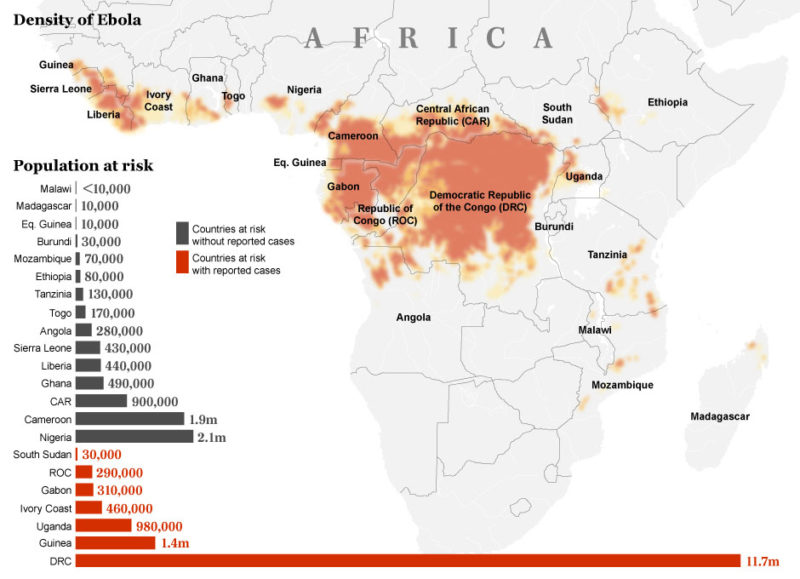Millions More at Risk in Ebola Outbreak, British Study Finds
Oliver Duggan, Telegraph (London), September 10, 2014
The deadliest Ebola outbreak in history could spread to a further 15 countries in West and Central Africa, putting up to 70 million people at risk of infection, a ground-breaking study has found.
Research by the University of Oxford compared historic outbreaks to the virus’ possible transmission in bats and chimpanzees to predict how the disease could spread through its vast animal reservoir.
It is the first time scientists have attempted to explain how the virus, which is contracted through contact with infected bodily fluids, has travelled westward across Africa.
The resulting map shows how the populations of the Central African Republic, Cameroon, Ghana and a dozen more countries could be hit by the outbreak, which has already killed nearly 2,300 people in 2014.
Several species of bat are suspected of carrying the virus through the jungles of West and Central Africa without showing symptoms, passing the disease onto other animals which are eaten by some communities as “bush meat”.
Researchers said transmission to the human population was not “inevitable”, but that environmental factors in many more countries than previously considered made it possible for further Ebola outbreak outbreaks.
According to the Oxford study, Cote D’Ivoire, Gabon, Angola, Tanzania, Togo, Ethiopia, Mozambique, Burundi, Equatorial Guinea, Madagascar and Malawi could also join those countries already affected.
More than 1,000 people have so far died in Liberia, where the country’s Defence Minister Brownie Samukai has said the disease threatens the country’s very existence.
“Liberia is facing a serious threat to its national existence. The deadly Ebola virus has caused a disruption of the normal functioning of our State,” he said yesterday.
Further deaths have been reported in Sierra Leone, Nigeria and Guinea and one case has recently been confirmed Senegal.
The Oxford study’s author Nick Golding, a researcher at the University’s Department of Zoology, said: “Our map shows the likely ‘reservoir’ of Ebola virus in animal populations, and this is larger than has been previously appreciated.
“This does not mean that transmission to humans is inevitable in these areas; only that all the environmental and epidemiological conditions suitable for an outbreak occur there.”
















